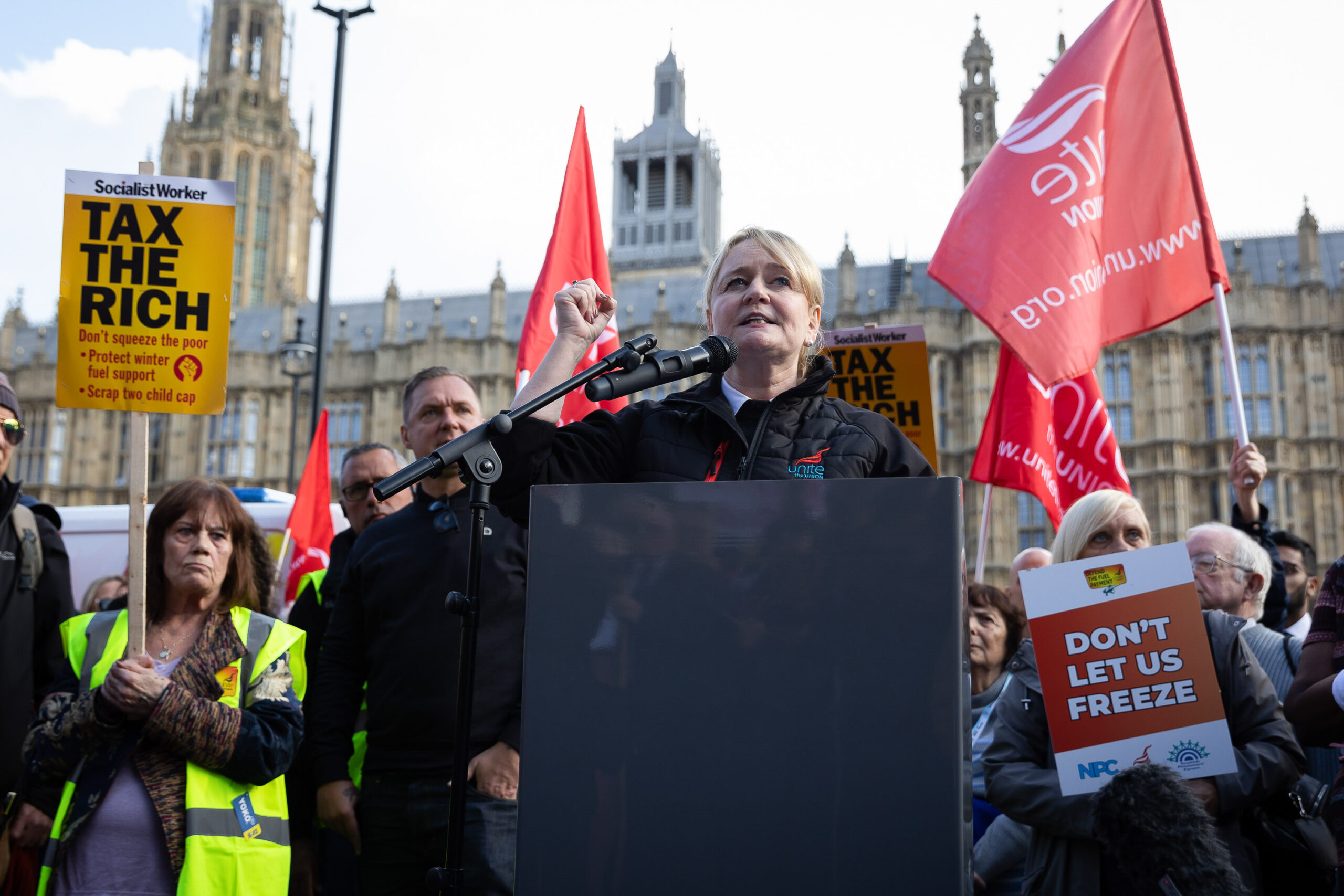Unite Votes for Israel Arms Embargo
‘Have we done everything we can to stop the genocide?’
by Polly Smythe
14 July 2025

Unite, one of the largest trade unions in the UK, has voted to support members who refuse to build, handle or transport weapons destined for Israel and for a full arms embargo on Israel.
On Thursday, Unite’s policy conference passed a statement which commits the union to support worker-led campaigns to boycott the handling of Israeli goods, as well as campaigns for divestment from Israeli companies.
The passage of the statement constitutes a breakthrough for pro-Palestine campaigners within the union.
Tensions within the union have arisen over the perceived threat to the jobs of Unite’s members in aerospace and defence, including at BAE Systems, from the boycott, divestment, and sanctions (BDS) movement and broader Palestine solidarity groups that target weapons manufacturers.
Last March, Unite general secretary Sharon Graham sent a letter to union staff and organisers, hitting back at actions taken by groups like Palestine Action and Workers For A Free Palestine against arms manufacturers.
The letter said that there was “no contradiction for a trade union to hold a position of solidarity with Palestinian workers, while at the same time refusing to support campaigns that target our members’ workplaces without their support.”
It continued: “The ‘first claim’ on our priorities is always the protection and advancement of our members’ interests at work […] Unite cannot and never will advocate or support any course of action which is counter to that principle.
“We cannot and will not endorse any organisation which decides unilaterally and without any discussion (let alone agreement) with the workers themselves, to support the targeting of our members’ workplaces or their jobs.”
Speaking at the conference, Unite delegate Nicodemus Leo challenged this framing: “What is our solidarity worth, if we have to ask for permission to interrupt the genocide? There needs to be a red line – whenever there is a war crime happening, or a genocide happening, we’ll take all action, regardless if it puts jobs at risk.”
Unite has also been notably absent from national demonstrations for Palestine, where speeches from trade union figures are a regular occurrence. A perception among members that the union is not doing enough to support Palestine resulted in a record number of motions about Palestine being received at the conference.
These tensions are reflected in the motion, which notes that “prior to taking action Unite will engage with members and reps in any affected sectors.”
It also denounces “any action that will put members’ jobs at risk without their consent […] While site reps continue to defend people’s right to protest, we cannot condone protestors who abuse or blame our members for the actions of the Israeli government.”
It also encourages reps to “refute any myths” spread by protestors.
The statement commits the union to encourage branches to affiliate to Palestine Solidarity Campaign (PSC) and to support PSC demonstrations, including by sending representatives to speak.
In addition, Unite will work with PSC to engage members and reps in sectors and industries that are identified as complicit with war crimes to ensure their full coordination with the union’s campaign.
During debate on the motion, Megan de Meo, a member of the union’s executive council, said that the union is “not without its challenges and complications” and that there are “tensions that exist in the depth and breadth of our union.”
However, she added that as a union, “we can overcome these tensions and bring our union together.”
Another Unite delegate, Rachel Eborall, said: “We need to ask ourselves, ‘Have we done everything we can to stop the genocide?’ As trade unionists, we know this isn’t just about what we’ve done as individuals, but what we do collectively.”
PSC said that “while we recognise the need to defend workers jobs, this must not be an excuse for a failure to take action to end complicity in genocide.” It added that it was “looking forward to working with Unite and union members to help to implement these policies.”
Harvey Irving, a Unite member who brought a motion on Palestine to the conference, told Novara Media that the statement was a positive step forward, and the result of a groundswell of members organising across the union.
However, he noted that “a motion is only as good as it is actually enforced. I’d love to see more action within Unite, whether that’s regional officers and organisers looking at how we can build campaigns with workers and reps, particularly in the arms and logistics industry to prevent the flow of arms.”
The motion does not set out how these newly agreed policies will be implemented, with several resolutions dedicated to the establishment of committees tasked with organising workers and ensuring BDS compliance being scrapped or watered down.
Instead, the emphasis is on “worker-led” campaigns, with the statement providing workers an opening within the union to organise, as well as an opportunity to push the executive council for further action.
The motion also commits Unite to making a public statement in support of an arms embargo, although it’s not clear in what form the statement will come or when.
Workers For a Free Palestine, a network of pro-Palestine workers, announced that they will be working with Unite members to “ensure this policy is enforced,” with plans to visit arms factories and logistics hubs to speak to members.
A spokesperson from Workers For a Free Palestine told Novara Media: “Unite is the union for many workers involved in making and transporting arms, industries which are a key part of the British state’s support for Israeli genocide. These workers have significant potential power to halt the flow of arms to Israel and enforce an arms embargo from below where our government won’t.
“Until now, Unite’s general secretary had been actively discouraging that, but as a result of pressure from Unite members, including workers in arms-related sectors, Unite’s leadership has been forced to shift position, which removes blockages from workers taking action.
“Now the priority has to be encouraging and working with rank-and-file workers in these industries – whether Unite members or beyond – to take action to end British collusion with genocide, and that’s what we’re aiming to do.”
Polly Smythe is Novara Media’s labour movement correspondent.


